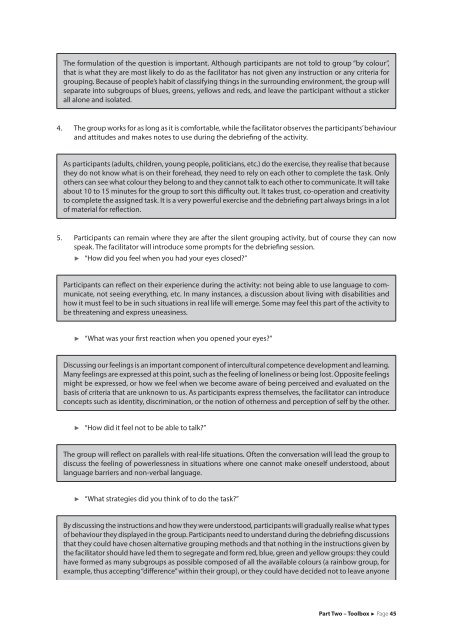TASKs for democracy
4NYw4W
4NYw4W
Create successful ePaper yourself
Turn your PDF publications into a flip-book with our unique Google optimized e-Paper software.
The <strong>for</strong>mulation of the question is important. Although participants are not told to group “by colour”,<br />
that is what they are most likely to do as the facilitator has not given any instruction or any criteria <strong>for</strong><br />
grouping. Because of people’s habit of classifying things in the surrounding environment, the group will<br />
separate into subgroups of blues, greens, yellows and reds, and leave the participant without a sticker<br />
all alone and isolated.<br />
4. The group works <strong>for</strong> as long as it is com<strong>for</strong>table, while the facilitator observes the participants’ behaviour<br />
and attitudes and makes notes to use during the debriefing of the activity.<br />
As participants (adults, children, young people, politicians, etc.) do the exercise, they realise that because<br />
they do not know what is on their <strong>for</strong>ehead, they need to rely on each other to complete the task. Only<br />
others can see what colour they belong to and they cannot talk to each other to communicate. It will take<br />
about 10 to 15 minutes <strong>for</strong> the group to sort this difficulty out. It takes trust, co-operation and creativity<br />
to complete the assigned task. It is a very powerful exercise and the debriefing part always brings in a lot<br />
of material <strong>for</strong> reflection.<br />
5. Participants can remain where they are after the silent grouping activity, but of course they can now<br />
speak. The facilitator will introduce some prompts <strong>for</strong> the debriefing session.<br />
<br />
“How did you feel when you had your eyes closed?”<br />
Participants can reflect on their experience during the activity: not being able to use language to communicate,<br />
not seeing everything, etc. In many instances, a discussion about living with disabilities and<br />
how it must feel to be in such situations in real life will emerge. Some may feel this part of the activity to<br />
be threatening and express uneasiness.<br />
<br />
“What was your first reaction when you opened your eyes?”<br />
Discussing our feelings is an important component of intercultural competence development and learning.<br />
Many feelings are expressed at this point, such as the feeling of loneliness or being lost. Opposite feelings<br />
might be expressed, or how we feel when we become aware of being perceived and evaluated on the<br />
basis of criteria that are unknown to us. As participants express themselves, the facilitator can introduce<br />
concepts such as identity, discrimination, or the notion of otherness and perception of self by the other.<br />
<br />
“How did it feel not to be able to talk?”<br />
The group will reflect on parallels with real-life situations. Often the conversation will lead the group to<br />
discuss the feeling of powerlessness in situations where one cannot make oneself understood, about<br />
language barriers and non-verbal language.<br />
<br />
“What strategies did you think of to do the task?”<br />
By discussing the instructions and how they were understood, participants will gradually realise what types<br />
of behaviour they displayed in the group. Participants need to understand during the debriefing discussions<br />
that they could have chosen alternative grouping methods and that nothing in the instructions given by<br />
the facilitator should have led them to segregate and <strong>for</strong>m red, blue, green and yellow groups: they could<br />
have <strong>for</strong>med as many subgroups as possible composed of all the available colours (a rainbow group, <strong>for</strong><br />
example, thus accepting “difference” within their group), or they could have decided not to leave anyone<br />
Part Two – Toolbox Page 45


